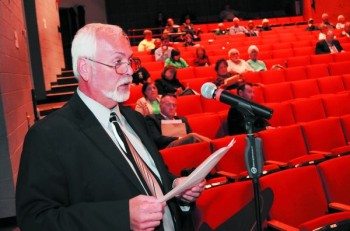
Robert Whalen, of Morgan County, reads a statement during the Public Service Commission hearing regarding Potomac Edison rates Monday evening at the Frank Arts Center on the campus of Shepherd University.
SHEPHERDSTOWN, W.Va. — Emotions flared Monday, as area ratepayers gathered in Shepherdstown to express opposition over the proposed 17.2 percent bill hike West Virginia residents could see in their energy bill starting in March.
Constituents posed a number of concerns and questions to the West Virginia Public Service Commission during two scheduled public hearings, with a clear consensus of opposition to the rate increase proposed by FirstEnergy.
While the total average energy increase is around 14.7 percent, residential costs will be nearly 2.5 percent higher if the change goes through.
If the PSC approves the request for additional revenue, this increase would mean that an average residential rate payer who uses 1,000 kilowatt hours would seen their bill rise from $92.62 to $108.55 per month. That would be nearly $15.93 per month or equal an average of $191 per year.
FirstEnergy has requested a total of $151 million, which boils down to $7 million to hire additional staff to handle meter reading starting next July, $48.4 million for tree-trimming costs and $96 million to cover recovery costs associated with cleanup from the June 2012 derecho, according to Marc Durbin, FirstEnergy spokesperson.
Although FirstEnergy believes the additional revenue requested is justifiable, those feelings weren’t shared by constituents who just want to keep the lights on.
Residents raised several questions on the proposed increase, including FirstEnergy salaries, training procedures and residents surviving on fixed incomes.
Helen Henderson, of Martinsburg, was one of many residents who testified on concerns of those with fixed incomes to be possibly affected.
After receiving a bill this winter for more than $800, Henderson said she is already struggling to pay her current rate.
“My husband and I have retired and it’s really a big hardship for us,” Henderson said.
Shepherdstown resident Carrie Singer also testified to the struggles of already paying energy costs when she was hit with an $800 bill after recently losing her husband, which resulted in a 60 percent loss of her income.
George Rutherford, president of the Jefferson County NAACP branch and Charles Town resident, also raised questions of how the increase will impact the senior citizen population and others on a fixed income. Rutherford calculated a few examples and said that for citizens who rely on Social Security to pay bills each month, the increase would be unaffordable.
“If they got $35 or $40 left at the end of the month, they are very happy because they’ve got some spending money. A 17.2 percent increase would amount to over $50 on a $300 bill, which means they don’t have enough to make the budget,” Rutherford said. “Where is the money going to come from? They are really hurting.”
With more than 17 percent of the average West Virginia population 65 years or older, according to 2013 U.S. Census data, the increase could affect numerous senior citizens who rely on a fixed income.
However, income wasn’t the only topic of conversation during Monday’s public hearings.
Residents also raised opposition in having to pay for the request by FirstEnergy to need revenue to cover additional staffing and tree-trimming maintenance.
Bill Clark, an area resident, echoed the consensus of others during the hearing against having to pay for those services.
“The Public Service Commission should take steps to ensure that utilities are only receiving the necessary costs to provide the essential utilities, which means they are already supposed to be reading meters, which means they are already supposed to be trimming trees,” Clark said.
After the public hearing, Durbin responded to the residential views and said requested revenue for tree-trimming costs is part of a vegetation management plan FirstEnergy discussed with the PSC after the derecho.
“The company has always done tree trimming,” Durbin said. “It’s not like we weren’t doing any, we have been. All utilities do that. … It’s just this was an additional program to cut back even more from the wires to try to prevent outages from happening that way.”
During his testimonial, Clark also brought up the issue of being forced to use FirstEnergy because of the lack in consumer options.
“I resent having to pay someone to do nothing and not have a choice,” Clark said.
John Case, of Bolivar, testified during the hearing of the current issues in meter readings when he received a $900 electric bill after the derecho.
“Part of the request for the rate increase is based on paying for increased metering, which somehow in my view should have been their responsibility all along,” Case said. “Why should the public pay for a management error?”
In addition to public hearings scheduled throughout the state, the PSC has received more than 700 written testimonials, according to Karen Hall, PSC public information specialist.
Later this month, the PSC will hold an evidentiary hearing in Charleston to discuss all public comments regarding the proposed increase.





